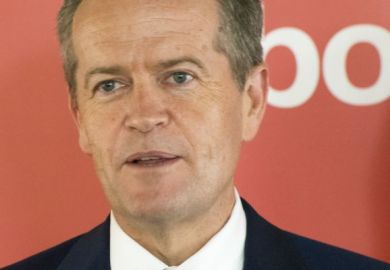Grant Robertson has been boss of New Zealand’s oldest university for just three months but, already, his old life has returned to haunt him.
“There’s been a few moments…where I’m face-to-face with decisions that I made as the minister of finance,” said Mr Robertson, whose career trajectory has taken him from the helm of university politics to the helm of national politics, and now to the helm of a university.
He was president of the Otago University Students’ Association and co-president of the New Zealand University Students’ Association in the 1990s, before working as a diplomat and adviser to former prime minister Helen Clark. His 15 years as a member of parliament culminated in six years as finance minister and three years as deputy to prime ministers Jacinda Ardern and Chris Hipkins.
Since July Mr Robertson has been back at the University of Otago, this time as vice-chancellor. Colleagues who run New Zealand’s seven other universities have also tangled with decisions he made as minister. “There’s been the odd joke at my expense,” he conceded.
Otago’s student newspaper, Critic Te Ārohi, has been delving into his pronouncements when he was student association president. “They’ve got a rich reservoir of things that I said many, many years ago. One particular quote…was a real rant. I think I was having a bad day.”
It is water off a duck’s back to Mr Robertson, who – along with Mr Hipkins, formerly a student leader at Victoria University of Wellington – was often confronted in parliament with quotes from his student politics days. “It was a regular sport. It’s all good fun, actually. It’s good to be reminded of your past. For the most part, I like to think I’m still standing up for the things I believed in.”
Mr Robertson was “a little bit concerned” that his non-traditional background, as the first non-academic vice-chancellor in Otago’s 155-year history, might arouse resentment among purists. Such worries proved unwarranted. “I’ve been welcomed by academics, professional staff, students alike…zero negative feedback from academia,” he said.
“I genuinely value and respect the work that academics do. Part of my job is to be an advocate for that work. Hopefully that’s what staff are…feeling.”
In any case, he describes himself as “academic-adjacent”. Two brothers are professors in the US while he had dealings with Otago during a stint as research marketing manager in the mid-2000s.
“Joshing” aside, his fellow vice-chancellors mostly appreciate the “perspective that I can bring” as someone with high-level political experience. His former combatants in the recently elected conservative government are similarly pragmatic. “I…reached out to the government and said, ‘Look, I just want to work constructively with you. I’ve got a job to do. You’ve got a job to do.’ So far, that’s happened.”
The “shared experience” with his erstwhile political opponents is more a benefit than a drawback, he said. “There’s a way for me to be able to work with them, talk to them, relate to them that is perhaps different. I tried as a politician to have respectful relationships with my opponents, and I’ve mostly been successful. I might disagree significantly on a policy matter, but I respect that people come to parliament with the best of intentions.”
Mr Robertson said that while the “busyness” of his new job was “familiar from politics”, the “commodity of time” was refreshing – albeit “overused” when it came to university decision-making. “A core essence of university is taking time to study, to research, to understand. It’s an absolute privilege.”
As part of a new breed of Australasian university leaders plucked from politics or civil service – including the University of Sydney’s Mark Scott, Charles Sturt University’s Renée Leon and the University of Canberra’s Bill Shorten – Mr Robertson could reasonably expect a baptism of fire.
Professor Scott and Professor Leon are both facing demands to resign – the former over his management of pro-Palestinian encampments on campus; the latter over her association with Australia’s disastrous “Robodebt” scheme to recover money from social welfare recipients, when she headed the federal Department of Human Services several years ago. She inherited the scheme and closed it down but an internal inquiry found that she had breached public service codes of conduct.
Mr Robertson said skeletons in the closet were not the preserve of former politicians and civic leaders. Academics also risk potential repercussions from unrelated former activities, he said.
“Obviously, if you’re in the political sphere, it tends to be a little higher profile. Things I did as minister of finance are debated regularly in parliament. I think it’s inevitable [that] those issues would arise, and I’ll just deal with them as they come up. It’s an open book. I’ve been living in the public eye for many years now.”
POSTSCRIPT:
Print headline: ‘It’s good to be reminded of your past’
Register to continue
Why register?
- Registration is free and only takes a moment
- Once registered, you can read 3 articles a month
- Sign up for our newsletter
Subscribe
Or subscribe for unlimited access to:
- Unlimited access to news, views, insights & reviews
- Digital editions
- Digital access to THE’s university and college rankings analysis
Already registered or a current subscriber?










